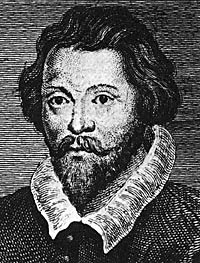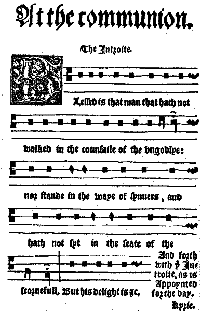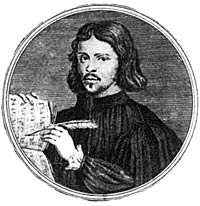Readings:
Psalm 47
1 Chronicles 15:16, 19-25, 28
Revelation 15:1-4
John 15:1-8
Preface of a Saint (3)
[Common of an Arist, Writer, or Composer]
[For Artists and Writers]
PRAYER (traditional language)
O God most glorious, whose praises art sung night and day by thy saints and angels in heaven: We offer thanks for William Byrd, John Merbecke and Thomas Tallis, whose music hath enriched the praise that thy Church offers thee here on earth. Grant, we pray thee, to all who are touched by the power of music such glimpses of eternity that we may be made ready to join thy saints in heaven and behold thy glory unveiled for evermore; through Jesus Christ our Lord, who livest and reignest with thee and the Holy Spirit, one God, for ever and ever. Amen.
PRAYER (contemporary language)
O God most glorious, whose praises are sung night and day by your saints and angels in heaven: We give you thanks for William Byrd, John Merbecke and Thomas Tallis, whose music has enriched the praise that your Church offers you here on earth. Grant, we pray, to all who are touched by the power of music such glimpses of eternity that we may be made ready to join your saints in heaven and behold your glory unveiled for evermore; through Jesus Christ our Lord, who lives and reigns with you and the Holy Spirit, one
God, for ever and ever. Amen.
This commemoration appears in A Great Cloud of Witnesses.
Return to Lectionary Home Page
Webmaster: Charles Wohlers
Last updated: 19 Sept. 2020
WILLIAM BYRD,
JOHN MERBECKE and
THOMAS TALLIS
Musicians, 1623, 1585, 1585
 William Byrd (1540 or late 1539- 4 July 1623) was an English composer of the Renaissance. He cultivated many of the forms current in England at the time, including various types of sacred and secular polyphony, keyboard and consort music.
William Byrd (1540 or late 1539- 4 July 1623) was an English composer of the Renaissance. He cultivated many of the forms current in England at the time, including various types of sacred and secular polyphony, keyboard and consort music.
Byrd obtained the prestigious post of Gentleman of the Chapel Royal in 1572 following the death of Robert Parsons. From the early 1570s onwards Byrd became increasingly involved with Roman Catholicism, which became a major factor in his personal and creative life. As a result, Byrd's membership of the Chapel Royal was suspended for a time, restrictions were placed on his movements and his house was placed on the search list.
Byrd's output of about 470 compositions amply justifies his reputation as one of the great masters of European Renaissance music. Perhaps his most impressive achievement as a composer was his ability to transform so many of the main musical forms of his day and stamp them with his own identity. Having grown up in an age in which Latin polyphony was largely confined to liturgical items for the Sarum rite, he assimilated and mastered the Continental motet form of his day, employing a highly personal synthesis of English and continental models. He virtually created the Tudor consort and keyboard fantasia, having only the most primitive models to follow. He also raised the consort song, the church anthem and the Anglican service setting to new heights.
John Marbeck, Merbeck or Merbecke (c. 1510 – c. 1585) was an English theological writer and musician who produced a standard setting of the Anglican liturgy. He is also known today for his setting of the Mass, Missa per arma iustitie.
Probably a native of Beverley in Yorkshire, Merbecke appears to have been a boy chorister at St. George's Chapel, Windsor, and was employed as an organist there from about 1541. Two years later he was convicted with three others of heresy and sentenced to stake, but received a pardon owing to the intervention of Stephen Gardiner, Bishop of Winchester.
 In the same year Marbeck published his Booke of Common Praier Noted, intended to provide for musical uniformity in the use of the First Prayer Book of Edward VI. This set the liturgy to semi-rhythmical melodies partly adapted from Gregorian chant; it was rendered obsolete when the Prayer Book was revised in 1552. It was however rediscovered in the 19th century, and adaptations for the 1662 liturgy are still in use. Marbeck wrote several devotional and controversial works of a strongly Calvinistic character, and a number of his musical compositions are preserved in manuscript in the British Library, and at Oxford and Cambridge. He died, probably while still organist at Windsor, about 1585.
In the same year Marbeck published his Booke of Common Praier Noted, intended to provide for musical uniformity in the use of the First Prayer Book of Edward VI. This set the liturgy to semi-rhythmical melodies partly adapted from Gregorian chant; it was rendered obsolete when the Prayer Book was revised in 1552. It was however rediscovered in the 19th century, and adaptations for the 1662 liturgy are still in use. Marbeck wrote several devotional and controversial works of a strongly Calvinistic character, and a number of his musical compositions are preserved in manuscript in the British Library, and at Oxford and Cambridge. He died, probably while still organist at Windsor, about 1585.
from Wikipedia
 Thomas Tallis (c. 1505 – 23 November 1585) was an English composer. Tallis flourished as a church musician in 16th century England. He occupies a primary place in anthologies of English church music, and is considered among the best of England's early composers. He is honoured for his original voice in English musicianship.
Thomas Tallis (c. 1505 – 23 November 1585) was an English composer. Tallis flourished as a church musician in 16th century England. He occupies a primary place in anthologies of English church music, and is considered among the best of England's early composers. He is honoured for his original voice in English musicianship.
Throughout his service to successive monarchs as organist and composer, Tallis avoided the religious controversies that raged around him, though, like William Byrd, he stayed an "unreformed Roman Catholic." The reformed Anglican liturgy was inaugurated during the short reign of Edward VI (1547-1553), and Tallis was one of the first church musicians to write anthems set to English words, although Latin continued to be used. Toward the end of his life, Tallis resisted the musical development seen in his younger contemporaries such as William Byrd, who embraced compositional complexity and adopted texts built by combining disparate biblical extracts. Tallis retained respect during a succession of opposing religious movements and deflected the violence that claimed Catholics and Protestants alike.
More from Wikipedia